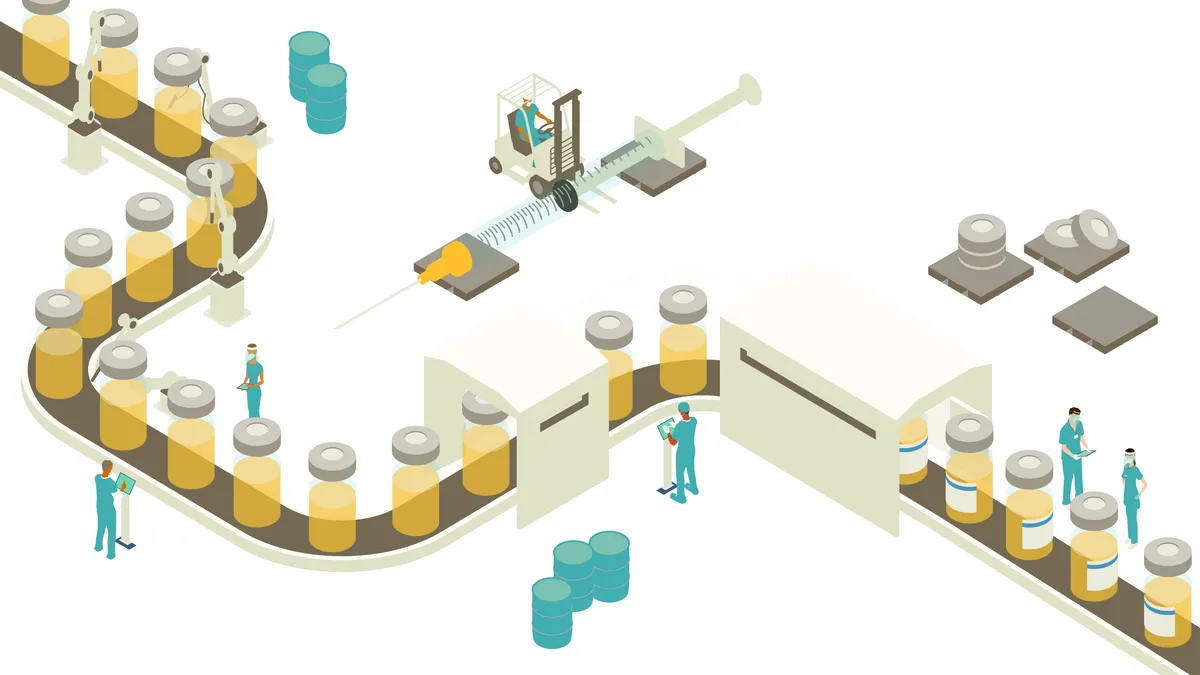Following a week of President Donald Trump’s tariff tornado ripping through Wall Street, wiping out trillions in market value, the administration’s about-face on trade yesterday sent stocks soaring. Still, pharma companies that were spared from the taxes on imported goods have been spinning in the high winds.
Although pharmaceutical products were given a brief exemption from the initial round of tariffs, Trump said Tuesday evening that his administration would “very shortly” make an announcement regarding a tax on drugs made abroad, even as China and the EU hit back with tariffs of their own.
Then, yesterday, he paused the newest round of tariffs besides a 125% levy against China.
The first round of “reciprocal” tariffs announced last week included a universal 10% tax on all imported goods that took effect over the weekend. And then dozens more were levied against specific countries beginning yesterday before the administration announced a pause that would reportedly last 90 days.
The erratic swivel of the crosshairs combined with general uncertainty surrounding the direction of the trade war already has Big Pharma feeling the market crunch, even before potential drug tariffs come to light.
Pharma market rout and return
For pharma companies around the world, the storm of uncertainty is still circling overhead.
Shares of Eli Lilly — which has the largest market capitalization among global drugmakers — along with fellow American pharmas AbbVie, Johnson & Johnson, Merck & Co. and Pfizer fell at least 2% Wednesday morning, the Wall Street Journal reported.
But by the afternoon, Lilly’s shares returned to growth upon the announcement of the tariff pause, along with those of its Big Pharma cohorts and the general markets.
While many foreign drugmakers fared worse as levies were threatened, they also bounced back yesterday. In the run-up to the pause, Novo Nordisk, Novartis, AstraZeneca and GSK also dropped at least 2%, and Roche and Sanofi plummeted 6% or further, according to the WSJ, which noted that Japanese pharmas Daiichi Sankyo and Takeda Pharmaceuticals also showed comparable declines in Wednesday’s early hours.
The 90-day reprieve a little after noon ET put foreign stocks outside of China back on the upward track.
‘Hard to come back’
Ahead of the pause, Lilly CEO David Ricks appeared worried the pharma industry would take a major, lasting hit from the levies.
“I think it’s a pivot in U.S. policy and it feels like it’ll be hard to come back from here,” Ricks recently told the BBC, saying the tariffs would likely shift manufacturing but may not have the U.S. revenue implications Trump has used to defend the actions.
Ricks also discussed which parts of Lilly’s massive business would need to be curbed if the company was forced to “eat the cost,” pointing to innovation as a probable victim of the circumstances.
“I predict R&D will come first,” Ricks told the BBC. “That’s a disappointing outcome.”
While about 70% of global research and drug development is conducted in the U.S., much of manufacturing and production takes place abroad, Ricks pointed out.
That imbalance is part of what the Trump administration is seeking to set straight, bringing business and jobs to the U.S. in its wake. Some drugmakers in India, one of the top pharma exporters, are doubtful the tariffs will result in a lasting impact, though, with U.S. policy subject to whipsaw from extreme to extreme.
“I’m not sure tariffs should dictate what we should be doing as players, because there is a risk that four years later, those tariffs may go away,” Cipla CEO Umang Vohra said at the Global Pharmaceutical Quality Summit in Mumbai, as reported by Reuters. “By the time you build a plant, tariffs have gone away. … So I just think we should take a more holistic view.”
So far, while economic calamity has given way to a market comeback, the long-term implications of a trade war are set to play out over the days or months to come.













